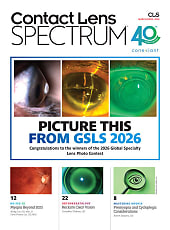editor's perspective
They Can't Wait for Refractive Surgery
BY JOSEPH T. BARR, OD, MS, EDITOR
March 2000
A recent article (Lui, Z., and Pflugfelder, S.C., The Effects of Long-Term Contact Lens Wear on Contact Lens Corneal Thickness, Curvature and Surface Regularity. Ophthalmology, 2000; Vol 107, No. 1: 105-111) reported on 20 patients (40 eyes) with five to 35 years of contact lens wear. Sixty-seven percent wore soft daily wear contact lenses, 18 percent wore soft extended wear lenses and 15 percent wore rigid gas permeable lenses. All 20 patients were compared to controls and measured for corneal thickness and topography. Corneal thickness was less in the contact lens wearers by 30 to 50µm (about 5 to 10 % of the corneal thickness). Corneal irregularity was greater in the contact lens wearers, but predicted visual acuity was not different between the groups. The subjects had been out of contact lens wear for at least two weeks.
Prior to reading this article, we observed a news release, which caused some to perceive that contact lens wear is likely to cause problems after a wearer has refractive surgery. It is the common practice of refractive surgeons to wait two weeks after habitual soft contact lens wear and three weeks after habitual rigid gas permeable contact lens wear to perform surgery. We have all known for decades that it can take weeks, or in some cases months, for the cornea to stabilize after habitual contact lens wear (as the references in the article point out). It may be preferable to wait for two consecutive visits, where refraction and corneal topography readings are stable prior to refractive surgery. Indeed, this is not the first report of contact lenses causing corneal thinning. More in-depth studies need to be performed, especially long-term studies after refractive surgery for former lens wearers.
These reports point out the importance of the proper management of patients prior to refractive surgery. But they leave many unanswered questions. For instance, how long were the lenses really off the eyes? In the news release, one author of the study says, "We are certainly not suggesting that people throw away their contact lenses. We are saying that surgeons and patients need to be aware of the potential risk factors and complications if patients have worn contact lenses for a long time." This study did not investigate post-surgical complications in contact lens wearers versus non-wearers.



